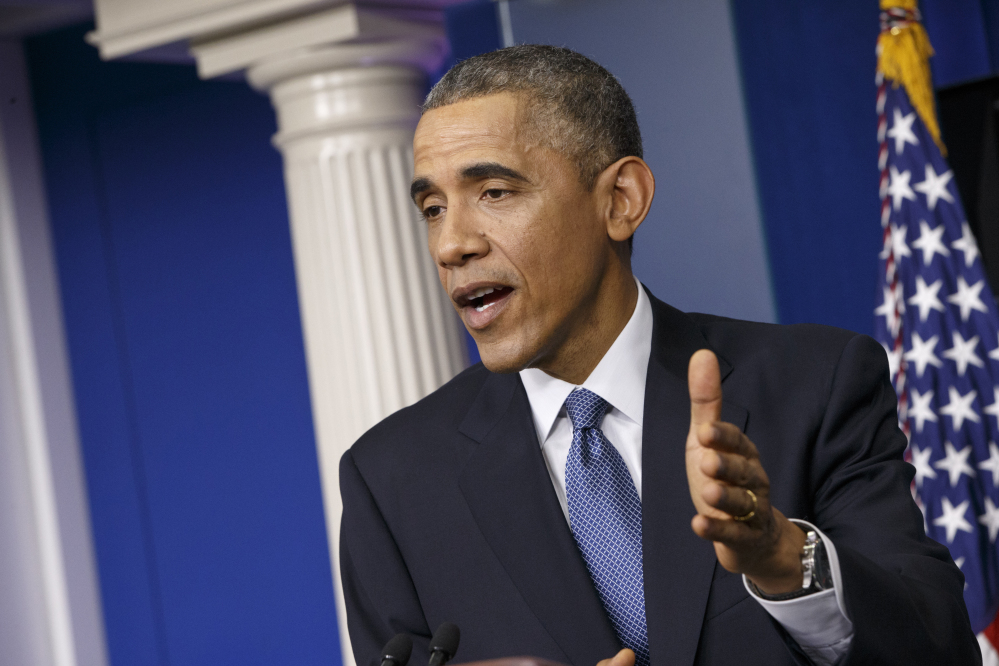HONOLULU — The United States imposed fresh sanctions on North Korea on Friday, targeting its defense industry and spy service in an attempt to punish Pyongyang for a crippling cyberattack against Sony. The sanctions are the first public act of retribution by the U.S. for North Korea’s alleged involvement.
Although it is unclear how painful the blow will be – North Korea already is under tough U.S. sanctions – the move signals that the U.S. is not backing away from its insistence that North Korea is responsible for the attack against Sony. North Korea has denied involvement, and some cybersecurity experts say it’s possible that it isn’t to blame.
“The order is not targeted at the people of North Korea, but rather is aimed at the government of North Korea and its activities that threaten the United States and others,” President Obama wrote in a letter to House and Senate leaders.
Never before has the U.S. sanctioned a nation in direct retaliation for a cyberattack on an American company. But U.S. officials said North Korea’s behavior “crossed a threshold” that necessitated a swift and decisive response.
The U.S. move also put North Korea on notice that payback will not be limited to those who perpetrated the attack. Ten people identified in the sanctions are there because they are associated with the North Korean government, not because of any known involvement with the episode against Sony, said Obama administration officials.
Rather, the U.S. sanctions are aimed at upping the pressure on North Korea by undermining its defense sector and making it nearly impossible for North Korean officials to do business overseas, said the officials, who briefed reporters on condition of anonymity.
Anyone who works for or helps North Korea’s government is fair game to be sanctioned under the executive order that Obama signed Friday while vacationing in Hawaii, officials said.
The sanctions also apply to three organizations closely tied to North Korea’s government: the country’s primary intelligence agency, a state-owned arms dealer that exports missile and weapons technology, and the Korea Tangun Trading Corp., which supports defense research.
All three were already subject to sanctions by the U.S., which has extensive sanctions aimed at North Korea’s nuclear program. Re-designating those groups under Obama’s new executive order appears to be primarily a symbolic move.
Those sanctioned will have any assets in the U.S. frozen and will be barred from using the U.S. financial system. Americans will be prohibited from doing business with them.
With the sanctions, the U.S. put renewed force behind its claim that North Korea’s government was the culprit in the attack, which led to the disclosure of tens of thousands of confidential Sony emails and business files, then escalated to threats of terrorist attacks against U.S. movie theaters.
North Korea has denied involvement, while expressing fury over the Sony film “The Interview,” a comedy that focuses on the fictional assassination of North Korean leader Kim Jong Un. When Sony initially called off the release of the film, Obama criticized the decision and warned against letting foreign dictators impose censorship in the U.S.
But even in the U.S., not everyone is convinced that North Korea was to blame. Cybersecurity firms have raised the possibility that a Sony insider could be behind the attack and said the evidence the FBI has made public doesn’t conclusively point to North Korea.
U.S. officials dismissed those arguments, arguing that independent cyber-experts don’t have access to the same classified information as the FBI.
“We stand firmly behind our call that the DPRK was behind the attacks on Sony,” said a senior Obama administration official. North Korea’s official name is the Democratic People’s Republic of Korea.
Last week, a nearly 10-hour shutdown of North Korean websites prompted widespread speculation that the U.S. had launched a counterattack. But White House spokesman Josh Earnest, in a statement, said Friday that the stepped-up sanctions “are the first aspect of our response.”
Despite Earnest’s comments, U.S. officials continued on Friday to refuse to say whether the U.S. was responsible for shutting down North Korea’s Internet.
North Korea and the U.S. remain technically in a state of war because the 1950-53 Korean War ended with an armistice, not a peace treaty. The rivals also are in an international standoff over North Korea’s nuclear and missile programs and its alleged human rights abuses.
Copy the Story LinkSend questions/comments to the editors.



Success. Please wait for the page to reload. If the page does not reload within 5 seconds, please refresh the page.
Enter your email and password to access comments.
Hi, to comment on stories you must . This profile is in addition to your subscription and website login.
Already have a commenting profile? .
Invalid username/password.
Please check your email to confirm and complete your registration.
Only subscribers are eligible to post comments. Please subscribe or login first for digital access. Here’s why.
Use the form below to reset your password. When you've submitted your account email, we will send an email with a reset code.